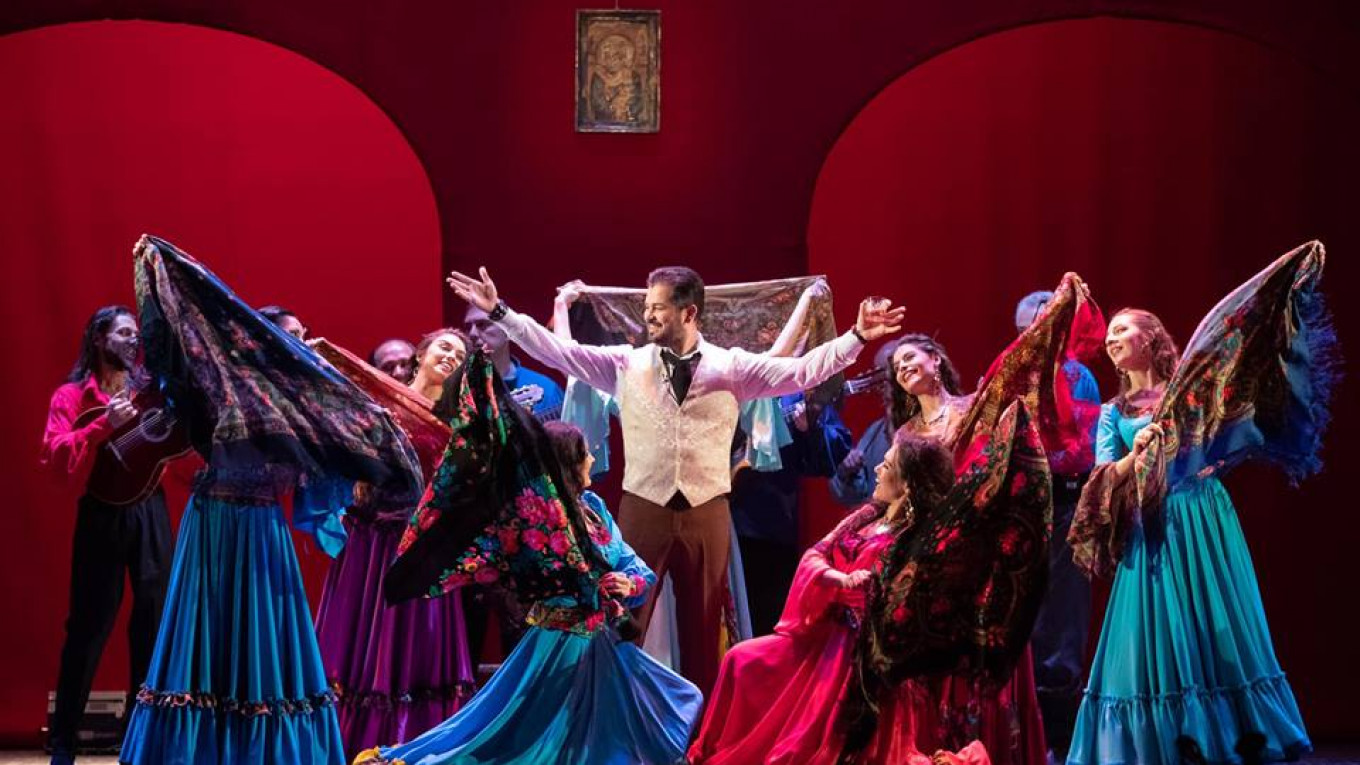When in Moscow, see what is unique to Moscow. That is the credo that sends tourists and expats to the Kremlin, St. Basil’s Cathedral, and even Bunker 42.
It should also send everyone to the Romen Theater, the only dramatic and musical repertory theater in the world created by, run by, and dedicated to the culture of the Romani people. Right now, the theater is premiering a new version of an old favorite, “Grushenka,” a vibrant, musically stunning, and moving production that owes its story line to part of this nation’s fraught history in Russia.
The Romani people, who migrated from India over 1,500 years ago, have been in Russia for centuries, although the first mention of them in chronicles and official documents dates to the early 18th century. Nikolai Lekarev, musical director of the Romen Theater, who arranged the music and composed some of songs in “Grushenka,” told The Moscow Times that the Romani brought to the Russian Empire their own music with its eastern tonalities, but over time began to assimilate the music and culture of the people they lived among. In Russia, “Romani created a unique synthesis of ancient Russian melodies and their own tunes, combined with the great intensity of feeling and characteristic vocal runs.”
Always famed for their singing, in Russia Romani were gathered into the first choir by Count Orlov in 1774, although the choir only performed Russian songs. In later decades they combined Russian and Romani songs, creating a genre that Lekarev says does not really exist: the so-called “gypsy romance.” These are “Russian romances sung by Romani singers, who imparted something of their own to them,” he said.
In Moscow, Romani singers were not allowed to perform in the city, so they sang and danced in clubs and restaurants “outside Moscow,” in places like the “Yar” restaurant in Petrovsky Park. The Yar still exists today — between Belorusskaya and Dinamo metro stations — in the Sovetsky Hotel. And since 1969, the hotel is also home to the Romen Theater (founded in 1931), which has preserved the Soviet classical ornamentation and excellent acoustics.
"Grushenka"

“Grushenka” is based on a short story called “The Charmed Wanderer” by Nikolai Leskov, about a beautiful, passionate and yet strongly moral Romani woman, Grushenka, who is loved by three men. One is a young man in her camp; a second, Golovan, is a wanderer with a knack for taming wild horses; and the third is a local Russian prince. When the governor of the region wants to evict the Romani camp, the Russian prince agrees to pay an enormous bribe to allow them to stay — but only if he can have Grushenka. Although the camp and her young admirer are adamantly against it, Grushenka is willing to make the sacrifice to save her people. She eventually falls deeply in love with the prince, but he grows bored with her and seeks a wealthy bride. The Romani are forced to leave despite the bribe, Grushenka is abandoned by the prince, and the story ends tragically for all. Terrified that she will take on the mortal sins of murdering the prince and his bride and then committing suicide, she begs Golovan to end her life.
Even without understanding the dialog, the audience can figure out what is going on. But if a few plot details slip by, no matter: The singing and dancing are breath-taking. In the first act an entire choir appears on stage in vibrantly colored costumes, singing solos, duets, and ensemble pieces. The women dance alone and together with shawls and the many layers of their full skirts. Grushenka is courted by her young admirer with guitar songs, ballads and dance, and she replies with heart-rending singing and dancing. One of the highlights of the performance is a song and dance by an older Romani woman performer, whose self-confident, mature sensuality is mesmerizing. The voices of the singers, particularly the soloists, are powerful, emotional, and crystalline as they ascend and descend in long stretches of notes or join together in harmonies that are Romani — that is, not quite Western and not quite Eastern, but something unique to this culture in Russia.
Lekarev said that in this new production of “Grushenka,” the dramatic line of the musical play remained the same. He did, however, make some changes to the music to meet some of the expectations of today’s theater-goers. “But I’m careful not to go too far. I wrote solos and duets in the spirit of the times. Classics should remain classics. A nation must never forget the art and culture of its ancestors.”
Romen Theater. 32/2 Leningradsky Prospekt. Metros Belorusskaya and Dinamo. See the theater site for more information in Russian. The next performances of "Grushenka" are May 19 and 26.
The Moscow Times will be raffling off two tickets to a performance of "Grushenka." Check online and on our social media for more information next week.
A Message from The Moscow Times:
Dear readers,
We are facing unprecedented challenges. Russia's Prosecutor General's Office has designated The Moscow Times as an "undesirable" organization, criminalizing our work and putting our staff at risk of prosecution. This follows our earlier unjust labeling as a "foreign agent."
These actions are direct attempts to silence independent journalism in Russia. The authorities claim our work "discredits the decisions of the Russian leadership." We see things differently: we strive to provide accurate, unbiased reporting on Russia.
We, the journalists of The Moscow Times, refuse to be silenced. But to continue our work, we need your help.
Your support, no matter how small, makes a world of difference. If you can, please support us monthly starting from just $2. It's quick to set up, and every contribution makes a significant impact.
By supporting The Moscow Times, you're defending open, independent journalism in the face of repression. Thank you for standing with us.
Remind me later.







